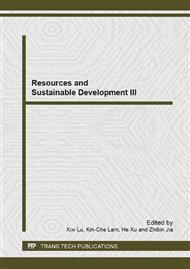p.305
p.309
p.313
p.317
p.322
p.328
p.334
p.339
p.344
Experimental Study on the Thickness Effect of Composite Coal and Rock Containing Gas
Abstract:
Based on the self-made triaxial servo-controlled seepage equipment for thermo-hydro-mechanical coupling of coal containing gas, the experimental study on the thickness effect of composite coal and rock containing gas was carried out with the length of composite coal and rocks, confining pressure and gas pressure fixed, meanwhile change the thickness of sandstones and coal. The results show that the strain-stress curve of composite coal and rock containing gas has great identity with the typical strain-stress curve of coal or rock. The thickness effect does exist in the composite coal and rock, different thickness ratios between sandstone on top and coal have different effect on the peak strength of composite coal and rocks. When the ratio of sandstone on top to coal is close to 1.1, the extremum of the peak strength will appear more easily in the condition of the same coal thickness. The strength of composite coal and rocks will fall if the ratio is higher or lower than the ratio of thickness correspondence of the extremum, moreover, the speed of decrease is higher when the sandstone is thinner than the coal. The peak strength of composite coal and rocks varies between the strength of coal and the sandstone. The elasticity modulus of the rock-coal-rock body varies between the coal and sandstone, moreover, an extremum appears more easily when the ratio of sandstone on top to coal is close to 1.1. The poisson's ratios of composite coal and rocks are lower than sandstone, higher than coals. The results have a reference value in the support of half coal crag tunnel and the mechanical features of the composite coal and rocks containing gas.
Info:
Periodical:
Pages:
322-327
Citation:
Online since:
June 2014
Authors:
Keywords:
Price:
Сopyright:
© 2014 Trans Tech Publications Ltd. All Rights Reserved
Share:
Citation:


